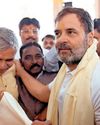
NATWAR GOPAL MALPANI, 76, still remembers the horror of the Jaipur serial blasts in 2008. He and his wife, Bhagwati Devi, 54, had just become grandparents. Bhagwati was shopping at Johri Bazaar when the explosions happened, abruptly ending the new chapter in her life.
“A shrapnel hit her head and she fell; she writhed in pain for 45 minutes. I will get justice only when the perpetrators are meted out the same treatment for killing innocents,” said Malpani, who runs an import-export business.
He had one question for the police, courts and politicians: “Why do we give the terror-accused a long rope, allowing them to take advantage of the system and the loopholes in the investigation?”
Malpani wants the real perpetrators to face the noose. “If the four accused are not the actual culprits, then the police should tell us who carried out the terror attacks,” he said.
On March 30, the Rajasthan High Court acquitted all four accused in the 2008 Jaipur blasts case, pointing at “systemic failure” leading to “inadmissible evidence”, “ignoring material contradictions’’, and “not properly considering the legal provisions in the Indian Evidence Act, Information Technology Act and the Code of Criminal Procedure” to prove beyond reasonable doubt the involvement of the four terror accused in the dastardly terror attack that killed 71 people.
The trial court had earlier convicted the accused and sentenced them to death. Last February, they were also sentenced to death by a trial court in the 2008 Ahmedabad blasts case.
Denne historien er fra April 23, 2023-utgaven av THE WEEK India.
Start din 7-dagers gratis prøveperiode på Magzter GOLD for å få tilgang til tusenvis av utvalgte premiumhistorier og 9000+ magasiner og aviser.
Allerede abonnent ? Logg på
Denne historien er fra April 23, 2023-utgaven av THE WEEK India.
Start din 7-dagers gratis prøveperiode på Magzter GOLD for å få tilgang til tusenvis av utvalgte premiumhistorier og 9000+ magasiner og aviser.
Allerede abonnent? Logg på

Use multi-asset investing to overcome portfolio volatility
EQUITY MARKETS have been choppy during this year. After rallying for the better part of the first nine months of 2024, equities corrected sharply in October and November, before taking off once again on rally mode in December.

Twist of faith
Upamanyu Chatterjee is back with his wry sense of humour in his new novel, and most of it is directed at religion and spirituality

THE GLORY OF SARI
Saris of Memory weaves together history and textiles, highlighting key moments from the author's collection

We win together
We invented chess, which was pretty cool of us. The original game 'chaturanga'that is four divisions (infantry, cavalry, elephantry and chariotry)-was a war strategy game. When the game travelled to the Middle East, they mangled the Sanskrit and it ended up being called 'shatranj' instead.

BEATS THAT HEAL
Music ignites the light within us, says Grammy-winner Chandrika Tandon

Older, smarter, sexier
Those who worship him regardless of where he works have continued to do so. Such is the power of Alessandro Michele, that after being the face of some mega brands for 10 years (namely Gucci and now Valentino), he remains bigger than the labels themselves. His debut collection for Valentino was presented at the recent Paris Haute Couture Week, and it has been adored by his adorers.

The road to peace
Future political dialogues should explore means of ensuring a more robust autonomy to tribal communities

Diary of a Sherpa
Amitabh Kant's new book is a comprehensive account of the G20 Summit held in Delhi in 2023

The annoying orange
Everything is great. All is sunshine. I am an eternal optimist.\" It's the fad of our TikTok times everything is not great, the sun sets daily, nothing is eternal. If anything, everything is ephemeral, night brings darkness, and optimism often crumbles under the weight of history. British philosopher Roger Scruton warned: \"Hope untempered by the evidence of history is a dangerous asset, one that threatens not only those who embrace it, but all those within range of their illusions.\"

NO SEAT, YET UPBEAT
The Congress is buoyed by its increased vote share in Delhi, and feels it can push the AAP into further decline